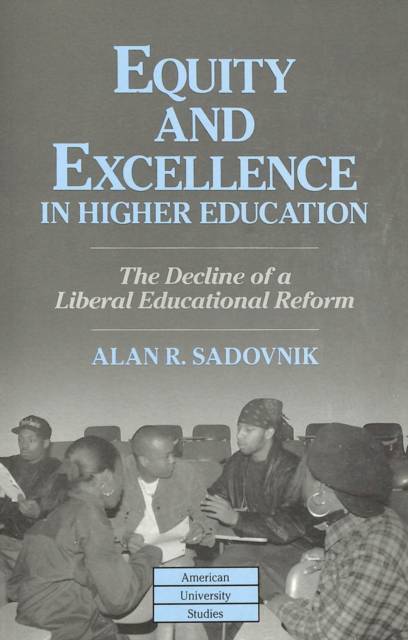
Bedankt voor het vertrouwen het afgelopen jaar! Om jou te bedanken bieden we GRATIS verzending (in België) aan op alles gedurende de hele maand januari.
- Afhalen na 1 uur in een winkel met voorraad
- In januari gratis thuislevering in België
- Ruim aanbod met 7 miljoen producten
Bedankt voor het vertrouwen het afgelopen jaar! Om jou te bedanken bieden we GRATIS verzending (in België) aan op alles gedurende de hele maand januari.
- Afhalen na 1 uur in een winkel met voorraad
- In januari gratis thuislevering in België
- Ruim aanbod met 7 miljoen producten
Zoeken
Equity and Excellence in Higher Education
The Decline of a Liberal Educational Reform
Alan R Sadovnik
€ 33,45
+ 66 punten
Omschrijving
Compensatory higher education programs developed as part of the liberal educational reforms of the 1960s and 1970s. Their goal was to compensate for unequal pre-college education and provide equal opportunities for economically and educationally disadvantaged students. This book provides a sociological and historical analysis of the rise and fall of one educational opportunity program that began as an off-campus branch of a state college in the late 1960s, moved to the main campus in the late 1970s, and was eliminated in 1983. The analysis relates to the larger policy questions in higher education, with special reference to issues of equity and excellence.
Specificaties
Betrokkenen
- Auteur(s):
- Uitgeverij:
Inhoud
- Aantal bladzijden:
- 297
- Taal:
- Engels
- Reeks:
- Reeksnummer:
- nr. 35
Eigenschappen
- Productcode (EAN):
- 9780820415932
- Verschijningsdatum:
- 1/02/1995
- Uitvoering:
- Paperback
- Formaat:
- Trade paperback (VS)
- Afmetingen:
- 292 mm x 154 mm
- Gewicht:
- 419 g

Alleen bij Standaard Boekhandel
+ 66 punten op je klantenkaart van Standaard Boekhandel
Beoordelingen
We publiceren alleen reviews die voldoen aan de voorwaarden voor reviews. Bekijk onze voorwaarden voor reviews.









